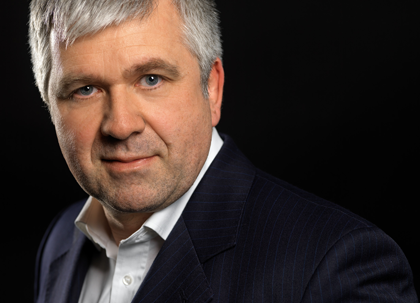15-12-2011
[Press] ERC Advanced Grant awarded to particle physicist Eberhard Widmann
Eberhard Widmann, director of the Stefan Meyer Institute for Subatomic Physics of the Austrian Academy of Sciences, receives an Advanced Investigator Grant of the European Research Council (ERC). His project entitled “Hyperfine Structure of Antihydrogen – HBAR-HFS” will be supported by 2.6 million Euros for a period of 5 years. ERC Advanced Grants are given for pioneering work in basic research and are regarded as the most prestigeous award for European scientists.

Antihydrogen is the simplest atom consisting entirely of antimatter. Since its hydrogen counterpart is one of the most precisely measured atoms in physics, a comparison of antihydrogen and hydrogen offers one of the most sensitive tests of CPT symmetry. CPT, the successive application of charge conjugation, parity and time reversal transformation is a fundamental symmetry conserved in the standard model of particle physics as a consequence of a mathematical theorem.
“The observed dominance of matter over antimatter in the universe and the know violation of other fundamental symmetries like CP call for an experimental test of the conservation of CPT symmetry” explains Eberhard Widmann. Furthermore, the conditions for this theorem to be fulfilled are not necessarily valid any more in extensions of the standard model like string theory or quantum gravity. Even a tiny violation of CPT symmetry at the time of the big bang could be a cause of the observed antimatter absence in the universe. Thus the observation of CPT violation might offer a first indication for the validity of string theory, and would have important cosmological consequences.
The ERC project aims at a measurement of the ground state hyperfine splitting (HFS) of antihydrogen (HBAR), which is expected to yield one of the most sensitive tests of CPT symmetry. The scientists expect new insights beyond the current understanding of particle physics and a possible explication of the antimatter absence in the universe. The experiments will be performed within the international ASACUSA1 collaboration at the unique source for low-energy antiprotons, the Antiproton Decelerator of CERN2, Geneva, Switzerland.
Eberhard Widmann
Eberhard Widmann studied physics at Stuttgart University (Germany) and obtained a Ph.D. there while working at the Max Planck Institute for Metals Research on a particle physics subject. He then changed his field to work on exotic atoms and spent several years in Japan (at the University of Tokyo and RIKEN3) and at CERN2. He is founding member and leader of the spectroscopy group of the ASACUSA1 collaboration at the Antiproton Decelerator of CERN2, and spokesperson of the FLAIR4 collaboration at the future FAIR5 facility in Darmstadt. In 1999 he obtained his habilitation in experimental physics form the Technische Universität München. In 2004 he became director of the Stefan Meyer Institute for Subatomic Physics of the Austrian Academy of Sciences, and honorary professor of Vienna University in 2005.
1) Atomic Spectroscopy And Collisions Using Slow Antiprotons
2) European Organisation for Nuclear Research, Geneva, Switzerland
3) Rikagaku Kenkyusho, The Institute of Physical and Chemical Research, Wako, Saitama, Japan
4) Facility for Low-Energy Antiproton and Ion Research, Darmstadt, Germany
5) Facility for Antiproton and Ion Research in Europe GmbH, Darmstadt, Germany
